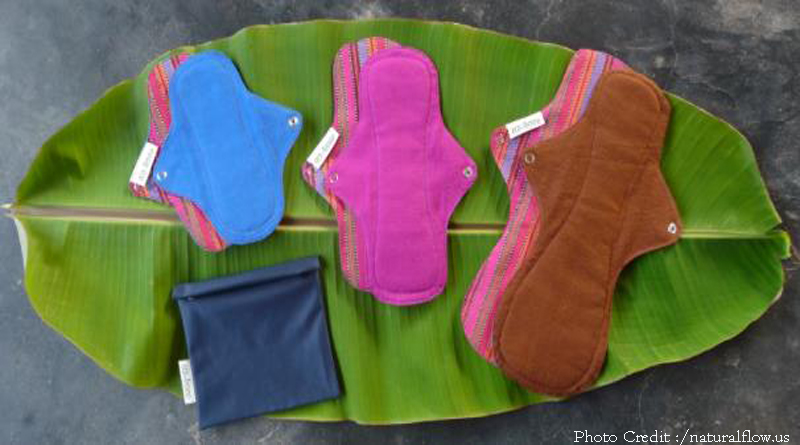

EcoFemme is a woman-led social enterprise founded in Auroville, Tamil Nadu, 2010, armed with the aim of spreading awareness about menstrual health in rural regions, create an environmentally friendly and sustainable future for menstrual products and empower women. EcoFemme produces washable cloth pads while giving educating adolescents about menstrual hygiene.
It is estimated that 432 million pads are used in India each month. One pad disposed today stays in the environment for up to 700 years, and is equivalent to fifty plastic bags. EcoFemme pads are made of organic cotton and are lined with a layer of leak-proof and breathable PUL (there are non PUL options available as well, the PUL is used to ensure the pad doesn’t leak through). The pad is designed like a regular pad, which means one can use them for 4-6 hours before changing them. The soiled pads can be washed, dried and used again. One EcoFemme pad is approximately equal to 75 disposable pads making EcoFemme a more sustainable option.
When the question of hygiene is raised, the company states that one would need to soak the pads in cold water before washing them thoroughly making sure the blood is completely removed and drying them. It is also imperative that the consumer discard the pads every few years depending in how heavy ones flow is or how jaded ones pad gets. The average lifecycle of these pads is 75 washes.
EcoFemme pads are more costly than the average pads. However, after the initial investment, considering the pads survive for 5 years (if it taken care off), cloth pads pose as a more economical option.
Kathy Walkling, the founder of EcoFemme first stumbled upon washable, reusable pads during her holiday in New Zealand. When Walker shifted to Auroville, a small sustainable community in Pondicherry, she was shocked over the lack of a proper disposable system for sanitary napkins in India. Kathy researched materials for her pad and started a small production. She initially sold her pads to the women of Auroville, who gave her positive feedback and showed an interest in promoting her products in their home countries.
In 2009, while working for an NGO called the Auroville Village Action Group (AVAG) she met Jessamijn Miedema who quickly joined walker on her project and both of them realised the market opportunity of their product abroad while incorporating livelihood creation and menstrual education into their project. In 2010 Walker and Miedema founded EcoFemme in its current incarnation as a social business and the company went from being a donor-funded organisation to a self-sustaining one.
Kathy initially aimed to sell her products to the niche but growing market of environmentally conscious women in the west. She quotes, “ even if only 1% of women of reproductive age adapt, then it would still be a massive market.” Being uncertain of the Indian market as people only use the “old” cloth method or the “modern” sanitary napkins, Walker decided to test prototypes of her product with rural women in India and was pleasantly surprised to see a positive feedback with 77% women opting for her pads over other methods. Kathy believes the main challenge lies in the perception of people over cloth pads. She plans to educate the society and advocates that keeping the pads clean and most importantly dry are key in making sure that the pads don’t get infected.
Over the years Kathy has seen a pleasant and unsuspecting shift in market share for reusable cloth pads, with the international market decreasing and the Indian market steadily increasing.
Besides the company’s effort in educating society about menstrual health, EcoFemme donates a pad to girl (below the age of 19) in a rural part of India for each pad they sell abroad, as a part of their Pad for Pad Program. They currently reach out to 280 girls per month as a part of this drive. In 2013, they launched the Pad for Sisters Program to make their products economical (subsidise the pads) for disadvantaged women (over the age of 19). In 2016-17 14,500 subsidised pads were sold all throughout India.
Currently EcoFemme is working towards certifying their original products and is coming up with a range cloth baby diapers.
The first unit of the Compressed Biogas Plant built by Reliance at the Peddapuram Industrial…
As Karnataka gains momentum in the direction of ‘waste to energy,’ the Mysuru City Corporation…
DCM Shriram Limited has announced that it has successfully commissioned a new Compressed Biogas (CBG)…
TKIL Industries has partnered with global biogas conglomerate KIS Group to advance the production of…
1. What is Awite and what does it have to offer to the Indian biogas…
The Indian Federation of Green Energy (IFGE) and the Embassy of Nepal have jointly organized…